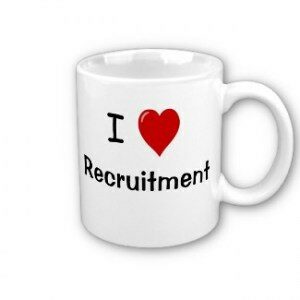“Those who have knowledge don’t predict. Those who predict don’t have knowledge.” – Lao Tzu
The recruitment industry has an uncertain future because recruitment will die … and soon.
Recruitment will be automated, thanks to machine learning and Artificial Intelligence (AI) that will make the job of recruiter not only obsolete, but without any future prospects. AI will replace recruiters with faster and cleverer algorithms that will pit candidates against open roles within seconds.
Smart chatbots will conduct interviews and send profiles directly to the hiring manager. Recruiters — aka, the “middle man” — will simply be removed from this equation.
Also, new sourcing tools, together with AI and algorithms, are going to make sourcers obsolete, and together with recruiters, they will need to start looking for new jobs because the end of recruitment is near!
Haven’t We Heard This Nonsense Before?
Recruitment will die in 2018! And if not in 2018, then 2019. And if not 2019, 2020, 2021, etc.
Oh wait — when did I hear a similar message before? Oh yes – back in 2008, 2009, 2010, 2011 ….
 Every year, some so-called “experts” that have never worked in recruitment (or as recruiters), or who do not understand the recruitment industry, are trying to bury recruitment — and recruiters — with these doomsday predictions. They are mostly written because they will get the author the attention they’re looking for.
Every year, some so-called “experts” that have never worked in recruitment (or as recruiters), or who do not understand the recruitment industry, are trying to bury recruitment — and recruiters — with these doomsday predictions. They are mostly written because they will get the author the attention they’re looking for.
Recruiters try to respond because they believe it’s all nonsense and that candidates who hate recruiters will start posting supporting messages with something like “It’s about time!” But 99 percent of the articles I have read over the years are not built on any relevant data or expertise. They are just based on wild speculation (guesses, really) that any amateur could make.
In short, these predictions about the end of recruitment lack understanding about how people make decisions.
We don’t know the future at all; we can only make guesses. Those guesses might be educated guesses, but in the end, they are still guesses.
A Few Words About Predictions …
Back around the year 2010, many predictions stated that job boards were dead, or would be dead, within two or three years because LinkedIn would replace them. And yet they are still here and some of them have turned into job aggregators adding new futures, etc.
Job boards tried to adapt to survive. And people in various industries are still using them to apply for jobs. In some countries, they are still the No. 1 source of candidates for companies. Monster or Indeed are still here, and they will be continue to be used for many more years to come.
Predicting the future is difficult, like forecasting the weather. It hasn’t improved even though we have satellites, super-fast computers, and more than enough data. Predictions may be good for a couple of days, but we are not able to predict the weather for the next two months and be correct every day.
Many experts predicted Hillary Clinton would be elected president of the United States and that Brexit would never happen, that Theresa May would win a landslide victory in the UK election…etc. And guess what? They were wrong.
It’s the same as many predictions about “Recruitment will die in X” (replace X with any year you want). These articles are just clickbait by people who don’t have a deep knowledge about the recruitment industry. Yes, these articles are going to get your attention and they will try to force you to react, especially if you are a recruiter. It’s the same method that tabloid media use to get more visitors on their sites.
These predictions are the same predictions that anybody can give. Right now, my prediction is that we will discover life on planet KIC 8462852 in 2019. If I am wrong, you won’t remember this prediction, but if I am right, I will post an article with title “I told you so.” But this prediction will just be a random guess, supported by nothing specific.
All these predictions are almost the same as the ones about the end of the world. Yes, it will make a catchy title – “End of the world in 2018” – but still, nothing is going to happen…and if you are right in this prediction? Well…nobody will be able to tell you that you are right because nobody will be alive.
Recruitment Is Not Going to Die
The good news is this: Recruitment is not going to die in 2018 or in the near future; it’s going to evolve.
Of course, recruitment is evolving every year, and recruiters are adapting as well. Our industry is influenced by new technologies, just like other industries, and new technology improves our jobs, makes them easier, and also brings new challenges.
New sourcing tools make all recruiters and sourcers more effective. They help us to find contact details for candidates faster than ever before, but they don’t turn those candidates into new employees with one click.
AI, smart chatbots, and machine learning will change our industry for sure, but we will adapt as always. Recruiter job scope will evolve, and sourcers can change into data miners. AI has algorithms, but they will not be able to give people a chance to succeed at an interview because their algorithm will evaluate that the person will not have a chance.
Remember — people hire people. Many of us will get a chance at a position that maybe we aren’t ready for yet, or that our resume doesn’t have the right keywords for, but the recruiter, hiring manager, etc. will give us the chance because they see something in us. They can see that we don’t have all the skills that are mentioned in the job description, but, they recognize our potential and willingness to learn.
People prefer to deal with … people
People like to connect and interact, and one human being always prefers to interact with another living being. And in the end, people want to speak with people and not Al.
Of course, AI will make recruiters’ lives easier, because it automates some tasks, but if everybody uses the same AI, they will only get some candidates, and the person who is trying to find other ways and sources will have a bigger advantage. Google indexes only 5 percent of the Internet, so where do you get the assurance that AI will index everything accessible?
Candidate experience is also something you need to consider.
Yes, bad recruiters could ruin the candidate experience, too, but tell me: If you have two companies offering the same role to you, and one offers you an interview with some AI and the second one with a live person, which interview would you choose, and which one would you be more comfortable with?
Recruitment is also about relationships, and recruiters establish great relationships with candidates and with hiring managers. Trust between candidates and recruiters is essential for good cooperation, especially when candidates are sharing their concerns about their current jobs and sometimes asking recruiters for confidential searches for other interesting opportunities.
Good recruiters will try to keep this in mind and contact candidates when they have a new role available. If you replace recruiters with AI, are you sure that candidates will share the same thing? Will they be able to say to AI: “Hey, I am open to the role, but it’s confidential.” I ‘m curious how effectively AI will deal with confidentiality, but I also hope it will be better than Yahoo at protecting their email service against hackers.
Conclusion
If you are a recruiter, you don‘t have to worry that the recruitment industry will die in 2018 or in the near future. Humans love connecting to other humans; they always have and most want to speak with live people.
People like to share stories and explain their career choices, fill in the gaps, and share why they feel they are the right person for the role. They want to get attention from recruiters if they are applying for a new job.
Candidates also expect professional help from us, and not only quick matching of our requirements and a comparison with the skills that candidates put into their resumes.
Our job is not only to find the candidate, but also to try to convince managers to give some candidates a shot and invite them for an onsite interview or phone interview — even if the hiring manager doesn’t see the potential in the resume.
We have already spent time with candidates and understand their needs and wants, and we saw something besides just raw data on a resume. And, we listened. That’s our biggest advantage against AI, because empathy is something that machines simply don’t have.
And if you are an author of one of these gloom-and-doom, recruiting-is-dying articles, instead of killing recruitment every year, try to learn more about it. It is often said there are two types of predictions — lucky or wrong. So, if you are betting that the recruitment industry will die in 2018, you are betting on the wrong horse. The recruitment industry will still be here after 2018. Maybe it will be slightly different, but believe me, it’s not going to die.
If you still are planning to kill the recruitment industry in any of your future articles, the years 2021-2025 are still available because nobody has used them yet.
 If you believe data more than predictions, let’s take a look at the results of a quick search I did (January 23, 2017) on Indeed Worldwide Search (see above). There could be an error in the search, but if there isn’t, it doesn’t look like recruiters are going to be without work anytime soon.
If you believe data more than predictions, let’s take a look at the results of a quick search I did (January 23, 2017) on Indeed Worldwide Search (see above). There could be an error in the search, but if there isn’t, it doesn’t look like recruiters are going to be without work anytime soon.
If you are a recruiter who is afraid of these doomsday predictions and believes them, I have good news for you. In some companies, recruitment is still stuck back in the year 2000.
So, even if the recruitment industry died in 2018, these companies would not find about it until 2036, so you still have time to get a job in one of those companies. And you don’t have to relocate, because they are in every country in the world.
Authors
Jan Tegze
Jan Tegze is Senior Recruiting Manager at SolarWinds, a company that “provides powerful and affordable IT management software to customers worldwide, from Fortune 500 enterprises to small businesses, managed service providers (MSPs), government agencies, and educational institutions.” He is also the author of the book Full Stack Recruiter: The Modern Recruiter's Guide, published October 2017. Jan has extensive experience in full life cycle recruiting, and broad knowledge in international recruiting, sourcing, recruitment branding, marketing and pro-active innovative sourcing techniques. Connect with him on LinkedIn or follow him on Twitter @jantegze .
Recruit Smarter
Weekly news and industry insights delivered straight to your inbox.





